
No to U.S. Colonialism
• Free the Puerto Rican Political Prisoners! Independence Now!
• Puerto Rican Activists Refuse to Testify for Grand Jury
• Demonstration Supports Puerto Rican Grand Jury Resister• Crime Against Humanity• Non-Aligned Movement Demands Independence for Puerto Rico at UN
• UN Calls On U.S. to Expedite Self-Determination of Puerto Rican People
Free the Puerto Rican Political Prisoners! Independence Now!
For almost three decades courageous fighters for Puerto Rico’s independence have been imprisoned by the U.S. They were imprisoned for defying U.S. colonialism and fighting for independence — a right belonging to all oppressed peoples and specifically defended by international law. The continued imprisonment of Oscar López and Carlos Alberto Torres was challenged at the United Nations by the Human Rights Committee of Puerto Rico. The organization made a presentation before the Decolonization Committee of the U.N. seeking the release of the Puerto Rican political prisoners. They joined dozens of other people speaking for independence at the UN session.
The Decolonization Committee of the U.N. discussed a new resolution that again recognized the right of Puerto Rico to self-determination and independence and called for the release of the political prisoners (see article below). Through vigorous struggle by Puerto Ricans and their allies in the U.S. and worldwide, some of their political prisoners were released. Puerto Ricans also succeeded in forcing the Navy to stop using its island of Vieques as a bombing range. Organizing is still going forward to secure reparations and clean up by the Navy for the grave environmental and human devastation caused.
Far from providing reparations and removing all U.S. bases from Puerto Rico, the FBI is now again harassing independence activists, including Elliot Monteverde Torres a lawyer and spokesperson for the Vieques Alliance in New York. The government refuses to free Lopez and Alberto Torres, as despite horrendous conditions of imprisonment, they remain steadfast in fighting to free Puerto Rico.
As Eduardo Villanueva, of the Human Rights Committee of Puerto Rico said in the presentation to the UN, “The U.S. has kept our political prisoners for 28 and 29 years behind bars, far from their families, subjected for many years to periods of sleep deprivation, sensory deprivation, denial of adequate medical care, and monitored telephone calls and communication as if they were common criminals, even when the United States knows that they are combatants for the self determination of Puerto Rico.” Numerous other organizations presented at the UN to demand an end to the crime of U.S. colonization of Puerto Rico.
Independence Now! Que Viva Puerto Rico Libre!
[TOP]
Puerto Rican Activists Refuse to Testify for Grand Jury
The government continues to try and disrupt the struggle for Puerto Rican independence, utilizing grand juries to conduct harassment and witch hunts of activists (see story below for more). The legal team for two of the fighters for Puerto Rican independence, Tania Frontera and Christopher Torres, subpoenaed by the grand jury, has informed that a hearing on their motion to quash the subpoena(s) is taking place on Friday, June 27th, at 2pm before Judge Carol B. Amon in the Eastern District of New York (Brooklyn Federal Court).
The Motion to Quash is a procedure where both sides are given the opportunity to argue for and against the issue of appearing before the grand jury. The judge can grant the motion to quash or deny their motions and imprison both companeros for "civil contempt."
Both Chris and Tania are using constitutional, international and historical grounds for "non-collaboration" with the government’s grand jury. These include their right as Puerto Ricans to resist U.S. colonialism and refuse to recognize U.S. courts as representing colonial occupiers of Puerto Rico and therefore not legitimate. It is also their right to resist colonial occupation and to see the grand jury as illegal as it is investigating their legitimate struggle for independence, a struggle recognized in international law and bodies, like the United Nations. The FBI has no jurisdiction to investigate the affairs of Puerto Ricans fighting for freedom.
Everyone is called on to pack the courtroom and demonstrate outside, June 27, 2pm.
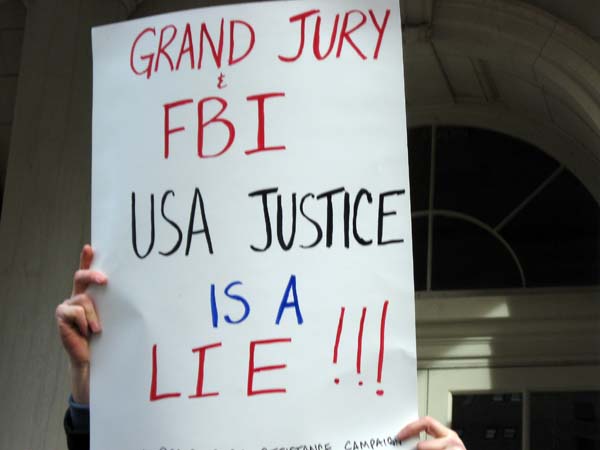
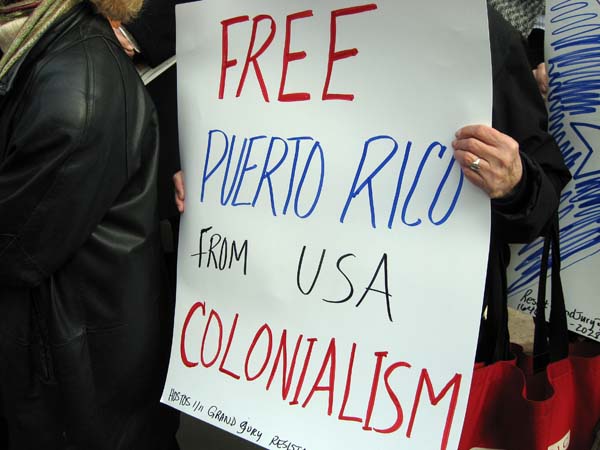
[TOP]
Demonstration Supports Puerto Rican
Grand Jury Resister
The Hostos Grand Jury Resistance Campaign, a coalition formed in New York in response to the recent round of grand jury subpoenas, calls on all freedom loving and progressive people to picket in front of the Brooklyn Federal Court on June 13, 2008 at 9:30 am to support Jose Diaz, the fifth person to be subpoena to the federal grand jury. He is the first resident from Puerto Rico called to appear to the grand jury investigating the Puerto Rican Independence Movement in Puerto Rico and in the Diaspora. He is forced to travel thousands of miles, leaving his family behind to come to Brooklyn, New York to fight this subpoena.
As we prepare for this picket, Tania Frontera, one the original three of the January 11 subpoenaed, has also been scheduled to appear for June 13, 2008 date. We must remain vigilante — Unite Against Grand Jury Repression!
Since the 2008 new year of 2008, Puerto Ricans Tania Frontera, a graphic designer, Christopher Torres, a social worker, Julio Pabon, a filmmaker, Elliot Monteverde Torres, a lawyer and spokesperson for the Vieques Alliance (a New York based coalition that fought to rid the U.S. Navy from the island municipality of Vieques, Puerto Rico) and now Jose Diaz, a veteran independentista and human rights activist, have been subpoena to the Brooklyn Federal Court in New York City. They attest that they will not be intimidated nor allow for their political ideas to be suppressed. The activists are refused to cooperate with the grand jury.
Historically, the U.S. has used the federal grand jury since the 1930s as an instrument of political internment of Puerto Rican pro-independence activists. Those who refused to testify by exercising the established pro-independence political principle of “non collaboration” to the grand jury can be held in “contempt of court” and imprisoned.
Simultaneous pickets will take place in Puerto Rico and Chicago denouncing grand jury repression and supporting grand jury resisters. We will also continue with the letter campaign, the educational teach-ins and other events. For more information see www.geocities.com/resistgrandjury
FBI Is the Homegrown Terrorist! FBI Out of Puerto Rico!
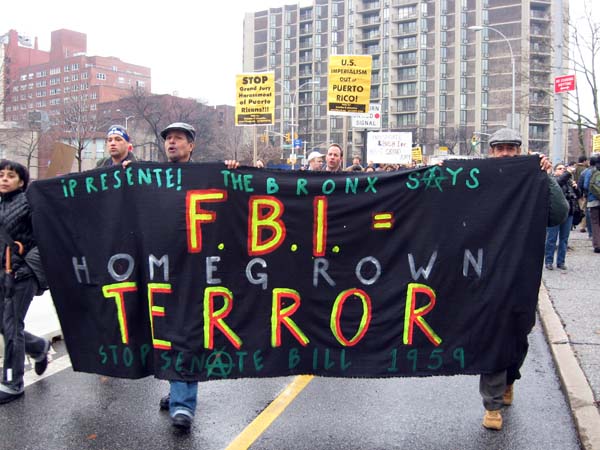
[TOP]
Crime Against Humanity is a play by poet and activist Michael Anthony Reyes Benavides and former Puerto Rican Political Prisoner Luis Rosa, directed by Michael Anthony Reyes Benavides. It is a National Boricua Human Rights Network and Batey Urbano Production
Imagine 27 years of your life living in a space 6 feet by 9 feet. Imagine being confined in isolation with no human contact. Imagine the shakedowns, the strip searches and the complete disregard for your humanity. Crime Against Humanity is a play based on the real life experiences of fourteen Puerto Rican political prisoners who spent more than two decades in prisons for seditious conspiracy — two of whom are still incarcerated. Crime Against Humanity brings us into the U.S. prison system in a way no other play has, focusing on the politically motivated use of isolation, selective punishment, sensory deprivation and disproportionate sentences.
Written by poet and activist Michael Anthony Reyes Benavides and former Puerto Rican political prisoner Luis Rosa, the play confronts the physical and mental torture these prisoners endured for more than 27 years. We gaze into their cell and experience the loss of parents, the transition of children into adulthood and feel the physical brutality and torture of a government out to make an example of them. We see them as they refuse to be victimized and objectified, confronting their hardships and adversities while maintaining their dignity, and upholding their humanity.
Reyes Benavides spent hours interviewing the former Puerto Rican political prisoners, and through extensive written correspondence, the two remaining political prisoners Oscar López Rivera and Carlos Alberto Torres. Through the play, we hear from their own mouths, their own words, exactly what it means to be a political prisoner in the United States.
Crime Against Humanity is produced by the National Boricua Human Rights Network and Batey Urbano. These two organizations hope to use this performance piece to raise consciousness and gain support for the campaign to free the remaining Puerto Rican political prisoners.
“By using theater as a tool of resistance, we hope to reach out to those sectors that are often ignored by traditional activist outreach. We want our families, our brothers and sisters and our community to come out and see what these prisoners endured, many of them for almost 20 years, two of them for more than 27 years,″ (author and director Reyes Benavides).
Crime Against Humanity will run for a year from March 3rd, 2008 through March 3rd, 2009 as a part of the Puerto Rican Cultural Center’s “100 x 35” campaign. This campaign will be celebrating the centennial of the birth of Puerto Rican national hero and poet Juan Antonio Corretjer and the 35th year of the founding of the Chicago-based Juan Antonio Corretjer Puerto Rican Cultural Center. As part of this celebration a national tour of the play will make stops in several U.S. cities: New York (in May), Philadelphia, Cleveland, Hartford, Washington D.C., Boston, San Francisco, and Los Angeles. The production has plans to tour throughout Puerto Rico in the future as well.
For more information contact Michael Anthony Reyes Benavides:
reyespoetry@gmail.com or 773-606- 4014.
[TOP]
Non-Aligned Movement Demands Independence for Puerto Rico at UN
The Cuban ambassador to the United Nations Rodrigo Malmierca presented a petition to the United Nations (UN) General Assembly’s Special Committee on Decolonization demanding the independence of Puerto Rico, on behalf of the Non-Aligned Movement (NAM). As president of the NAM Coordination Bureau, Malmierca requested that the Committee fully evaluate the colonial situation of Puerto Rico, under the rule of the United States for 110 years.
The case of Puerto Rico was debated in the UN General Assembly until 1953, when Washington managed to take it off the list of Non-Self-Governing Territories by alleging Puerto Rico’s autonomy under the status of “Associated Free State,” granted in 1952. The Special Committee on Decolonization has since that time approved 25 resolutions calling for independence.
The declaration of NAM reiterates the right of Puerto Ricans to self--determination and independence, a position already taken by the 118 countries that make up NAM’s members. This stand was stated in the final declaration of the 14th NAM Summit held in 2006 in Havana.
Representatives of the independence movement in Puerto Rico also took the floor before the Decolonization Committee to denounce the increasing interference of Washington in their island.
[TOP]
Special Committee On Decolonization Adopts Resolution
UN Calls On U.S. to Expedite Self-Determination of Puerto Rican People
The Special Committee on Decolonization today called on the Government of the United States to expedite a process that would allow the Puerto Rican people to fully exercise their inalienable right to self-determination and independence.
In a resolution adopted by consensus, the decolonization body requested the President of the United States to release all Puerto Rican political prisoners serving sentences for cases relating to the Territory’s struggle for independence and to the Vieques Island “peace struggle.” The Special Committee expressed serious concern regarding U.S. actions carried out against Puerto Rican independence fighters, and encouraged the investigation of those actions with “the necessary rigor.”
The Special Committee urged the U.S. to complete the return of occupied land and installations on Vieques Island and in Ceiba; respect the fundamental human rights to health and economic development of their inhabitants; and expedite and cover the costs of decontaminating the areas previously used in military exercises.
Introducing the text, Cuba’s representative said that, while the Special Committee and the General Assembly had been adopting 25 resolutions and decisions reaffirming the inalienable right of the Puerto Rican people to self-determination and independence, the United States, as colonial Power, had tried by all means to consolidate its economic, political and social domination over the “brotherly Latin American and Caribbean country.”
Over two days the Special Committee heard dozens of petitioners, who presented the views of various Puerto Rican groups, parties and organizations. Many requested the General Assembly to call on the United States to begin a just and equitable process to allow the people of Puerto Rico to exercise their right to self-determination, conforming to UN resolution 1514 (XV). Puerto Rican people could no longer tolerate that consideration of Puerto Rican self-determination be “parked in a corner of chimeras” by the Assembly, a representative of the Puerto Rico Bar Association said.
Among the issues that required attention, petitioners mentioned the imposition of the death penalty for federal crimes, despite its prohibition by the Constitution of Puerto Rico; extradition of those facing the death penalty; occupation and environmental contamination of Vieques; and political prisoners serving disproportionate sentences in U.S. jails.
Many petitioners urged the Special Committee to adopt the draft resolution before it, insisting that Puerto Rico was still one of the few remaining colonies in the world. Speakers described their people’s fight for self-determination and independence, requesting the Special Committee to urge the General Assembly to reconsider the situation of Puerto Rico and to call on the U.S. to begin a just and equitable process so the people of Puerto Rico can exercise their right to self-determination. The Special Committee was invited to visit Puerto Rico to investigate human rights violations as well as cases of racism, discrimination and exploitation.
Insisting that there was consensus today over the existence of a colonial relationship between the United States and Puerto Rico, a representative of the Puerto Rico Bar Association said it “requires a solution in tandem with this century.” The Puerto Rican people could no longer tolerate that consideration of their self-determination be “parked in a corner of chimeras” by the General Assembly. Petitioners also pointed out that Puerto Rico was the only nation in its region remaining under colonial rule, and its independence was a priority for Latin America and the Caribbean.
“Colonialism is contrary to international law, because it robs peoples and nations of their identity, language, culture, land and natural resources,” a representative of the National Lawyers Guild International Committee said, adding: “This crime continues in Puerto Rico today.” Puerto Rico remains subject to the plenary authority of the United States Congress under the Territory Clause, under which power the Congress could even cede Puerto Rico to another nation.
Outlining the activities of the Federal Bureau of Investigations (FBI) in Puerto Rico, she said that, as the wave of repression gathered force, so did the strong sentiment that the FBI must leave Puerto Rico. The FBI is continuing its long trajectory of criminalizing the independence movement and assuring the continued colonial status of Puerto Rico.
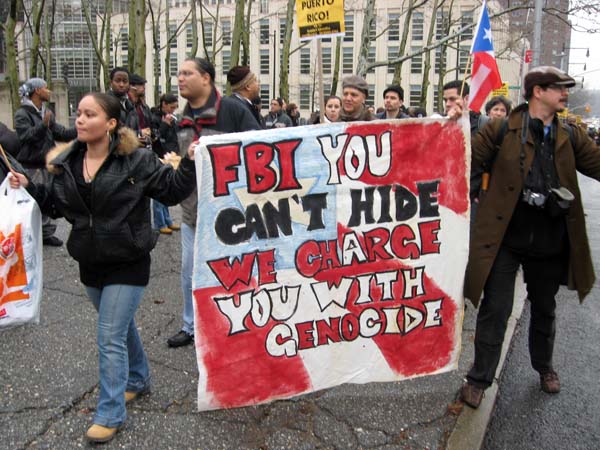
![]()
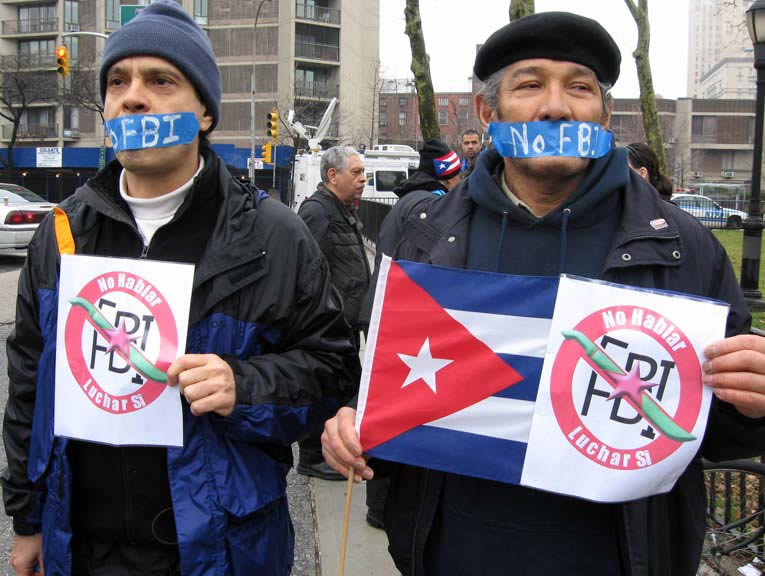
Other speakers protested the use of grand juries as a means of intimidation and harassment of independence-struggle supporters, as were raids on union headquarters and independence movements. Petitioners also pointed out that the colonial status weakened Puerto Rico, leaving it vulnerable to the dictates of industrial entities, which imposed their terms on people in need of jobs. Puerto Ricans now consumed what they did not produce and produced what they did not consume. Several others referred to the U.S. monopoly on the transportation of goods to and from Puerto Rico, the problem of rising prices as a result of Puerto Rico’s economic dependence on the U.S., and U.S. efforts to destroy Puerto Rico’s agriculture.
A representative of the Vieques Support Campaign said that, just four days ago, the United States Navy had carried out open-air detonations on Vieques, releasing scores of toxins into the air. The Navy and the corporation contracted to carry out the clean up continued to lie to the people, claiming, in particular, that thousands of bombs being detonated on Vieques could not be exploded in a controlled detonation chamber. The Navy was also seeking authorization to burn vegetation in order to find unexploded bombs, inflicting damage on the environment.
In addition, speakers from many countries also called for self-determination. These included representatives of Ecuador, Nicaragua, Bolivia, Panama, Venezuela, Dominica (on behalf of the Non-Aligned Movement), Syria, Iran, Saint Vincent and the Grenadines, and Cuba.
Cuba’s representative Rodrigo Malmierca concluded that the Special Committee’s action was highly relevant, as 2008 would mark 110 years since the United States had intervened in Puerto Rico. The adoption of the resolution also had special meaning for Cuba because of its historic commitment to the self-determination and independence of the fraternal people of Puerto Rico. Both countries had been subject to the Spanish colonial yoke, and both had suffered the same United States military intervention of 1898.
He said his country had counted on brave Puerto Rican soldiers, adding: “The Cuban people will never forget that more than 2,000 Puerto Ricans shed their blood on the Cuban battlefields during our independence wars.” […] Despite the long colonial domination, the Puerto Rican people had managed to keep their culture, identity and national sentiments. “The adoption of this resolution today is a tribute to the patriotic spirit of the Puerto Rican people and their tradition of struggle led by their heroes, who are also the heroes of Cuba and all the Americas.”